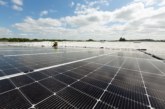
Following the European Court of Justice ruling that the UK’s longstanding reduced 5% rate of VAT on energy-saving products was in breach of EU laws, Knauf Insulation’s Managing Director – Northern Europe John Sinfield offers his response.
Triumphs of ‘process over purpose‘! We all recognise them when we hear them; indeed you can probably imagine the look on someone’s face as they deliver the line: “I see what you mean and actually I sympathise with what you want to do. Indeed, it is actually core to what the institution I work for wishes to achieve. However we have this rule – and I confess the rule was created to serve a completely different function – but I think it might apply to your case. So I am afraid we can’t allow this admittedly admirable and socially desirable activity to go ahead. Sorry. I really am. But they are the rules…”
This phenomenon wouldn’t exist in nature. Natural selection would have ruthlessly weeded it out. However, in large bureaucracies it thrives and a recent ruling from the European Court of Justice (ECJ) regarding the UK’s application of reduced rates of VAT for Energy Saving Materials is a clear example.
“The consumption of energy is charged at 5% VAT while the measures that allow householders to permanently reduce the need for that energy are charged at 20%.”
Currently, certain energy saving measures such as insulation receive a reduced VAT rate of 5% rather than the standard rate of 20%. The UK’s reasoning for this is that the refurbishment of our ageing and leaky housing stock constitutes a ‘social policy’, which permits the reduced rate. That is assuming the EU agrees with the justification. Which, as of yesterday they, and the European Court of Justice, made clear they didn’t.
So unless HMRC finds a route around the decision, energy efficiency measures will be hit with a 20% VAT rate. Compare that with a continued 5% rate charged on home energy bills. That’s worth repeating; the consumption of energy is charged at 5% VAT while the measures that allow householders to permanently reduce the need for that energy are charged at 20%.
Of course, in addition to the perverse contradiction whereby consumption of a valuable resource is rewarded and efficiency penalised, there is the wealth of social, environmental and economic arguments to become more energy efficient that both the EU and UK espouse. The policy imperatives listed are usually energy security, fuel poverty and climate change, although those three headings cover a multitude of downsides for individuals and states alike if energy efficiency is not driven forward.
“The new Secretary of State has a great opportunity to fix the Green Deal and create a strong market for people looking to improve their homes. But this ECJ ruling has just made it that much more difficult a task.”
Ironically, much of what had come out of the EU to date on energy efficiency pushed in the right direction. The recent Energy Efficiency Directive placed a requirement on member states to produce a long term plan to address the wasted energy in their building stock. It also requires them to propose a programme that would deliver against that long term plan.
Long term thinking was sorely missing in UK energy efficiency policy over the last parliament as grand plans in the Green Deal and ECO stumbled and hastily designed sticking plaster policies surpassed even previous schemes for their boom-bust short-term nature. We await an update on how the new Government will approach energy efficiency with the only news heard to date being a funding claw back from the GDHIF programme by George Osborne.
The new Secretary of State has a great opportunity to fix the Green Deal and create a strong market for people looking to improve their homes. But this ECJ ruling has just made it that much more difficult a task. Indeed, the option of using the Government’s balance sheet to buy down the current interest rate would likely just put the cost of a package of measures back to square one once the additional 15% VAT cost had been factored in.
So, as we enter a period where the UK must make a decision on a Brexit, I would like to see both the separatist and the better together camps set out how they will embed two core raison d’etre into decision making.
For the separatists wishing to bring powers back to these shores, they must set out their mechanism for embedding long term planning into short term parliaments because, from a narrow energy efficiency perspective at least, much of the recent focus on long term thinking has come from the EU. And, for the better together camp, given yesterday’s ruling, what’s the new mechanism for avoiding nonsensical decisions that fundamentally undermine stated goals?
If Europe cannot get this right, wider projects for all member states – such as long term energy security – seem far less achievable.
For more information visit www.knaufinsulation.co.uk
The official statement released to the press by the European Court of Justice can be read here (external site)










